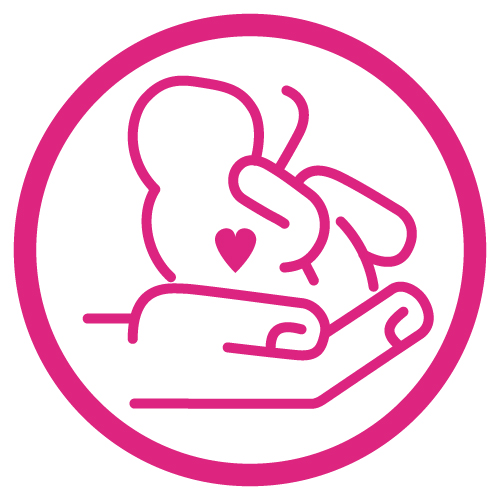 IBCLC Detailed Content Outline: Pharmacology and Toxicology Focused CERPs - Section IV
IBCLC Detailed Content Outline: Pharmacology and Toxicology Focused CERPs - Section IV
Access CERPs on Pharmacology and Toxicology for the IBCLC Detailed Content Outline recertification requirements. Enjoy convenient on-demand viewing of the latest Pharmacology and Toxicology focused IBCLC CERPs at your own pace.

Neonatal Pharmacodynamic and Pharmacokinetic Characteristics and Implications for Pharmacotherapeutic Decisions

John Brock Harris, Assistant Professor of Pharmacy, joined Wingate University School of Pharmacy in November 2012. He earned his Bachelor of Science in Chemical Engineering concentrating in Biosciences from North Carolina State University in 2002. After completing undergraduate work, he received his Doctorate of Pharmacy from The University of North Carolina – Chapel Hill School of Pharmacy in 2007. He completed his first year post-graduate education at New Hanover Regional Medical Center in Wilmington, North Carolina followed by second year post-graduate education specializing in pediatrics at Monroe Carell, Jr. Children’s Hospital at Vanderbilt in Nashville, Tennessee. Dr. Harris became Board Certified in Pharmacotherapy while completing his pediatric post-graduate work in 2009 and Board Certified in Pediatric Pharmacotherapy in 2016. Dr. Harris is an inpatient clinical practice faculty member in pediatrics at Novant Health Hemby Children’s Hospital in Charlotte, North Carolina where he has practiced for nearly 10 years.
This presentation will focus on the pharmacodynamic and pharmacokinetic principles in neonatal populations and the implications for medication selection and monitoring. We will discuss parameters related to these principles and how pharmacotherapeutic regimens are determined using them. Absorption, distribution, metabolism, and elimination of medications and the clinical impact of neonatal patient characteristics and medication properties on pharmacotherapeutic decisions will also be presented. We will also contrast medications and why medications may be preferred for some neonatal disease states due to medication characteristics. The information provided will act as a foundation for pharmacotherapeutic recommendations based on patient and mediation specific properties for neonatal disease states.


Jim Thigpen has been a pediatric clinical pharmacist for 30 years and is currently an associate professor of pharmacy at East Tennessee State University Bill Gatton College of Pharmacy. When he began his training at MUSC in Charleston, SC, they were investigating Survanta and he has been witness to and a participant in the evolving world of neonatology since. He has spoken at several neonatal nursing conferences over the years and enjoys helping other practitioners learn about and apply pharmacotherapy in this special population.
Topic: Clinical Pain Management in the Neonate - [View Abstract]
Topic: Pharmacotherapy for Hemodynamic Instability in Neonates - [View Abstract]
There are many causes of hemodynamic instability in the neonate, with up to half of very low birth weight (VLBW) infants exhibiting evidence of low cardiac output and poor myocardial contractility within the first 12 hours of life. Failure to appropriately identify and address the causes of hypotension can lead to dramatic consequences in this vulnerable population. Pharmacotherapy is employed to provide action at specific receptors that result in improved cardiac output, relaxation and vasodilation of smooth muscle, as well as specific effects on the kidneys. Although the common agents have been used for decades, there are new developments in therapy. Refinements on patient selection, managing expected side effects, and effective dosing and have continued to evolve.


Dr. Jennifer Barnes is the Neonatal Intensive Care Clinical Pharmacy Specialist at Levine Children’s Hospital in Charlotte, NC. She has over 10 years of experience within the field. Dr. Barnes received her bachelor’s degree at Virginia Tech and her Doctor of Pharmacy at Virginia Commonwealth University’s Medical College of Virginia. She completed her pharmacy practice residency at Alamance Regional Medical Center- Cone Health. Dr. Barnes is board certified in pediatric pharmacotherapy. She is also an active member of the Pediatric Pharmacy Association (PPA) and is currently serving as the neonatology committee chair. Dr. Barnes serves as a clinical assistant professor for pharmacy advanced practice rotations for University of North Carolina, University of South Carolina, Wingate University and High Point University. Her current research areas of interest include the role of diuretics in bronchopulmonary dysplasia treatment and antibiotic stewardship for late-onset sepsis amongst other topics.
Topic: Get the LOW Down on Neonatal Hypotension - [View Abstract]
Topic: Starbucks for Babies? Caffeine Use in Neonates - [View Abstract]
Caffeine is one of the most prescribed medications within the neonatal intensive care unit (NICU). This presentation will summarize the current understanding of caffeine therapy in neonates including the various indications. Caffeine is the medication of choice for apnea of prematurity (AOP) however it has been shown to be beneficial in several other disease states and conditions. Despite the widespread use of caffeine, there is not consensus on optimal dosing regimen or timing. We will review the supporting literature for the nuances of caffeine dosing regimens and schedules. While caffeine is generally considered a safe medication, we will also discuss potential side effects for monitoring. After this presentation, the audience will have a full picture of the pros and cons of this ubiquitous medication in our NICU population.

The Classics Versus New and Upcoming Therapies: Which is Better for Neonatal Seizures?

M. Petrea Cober, PharmD, BCNSP, BCPPS, FASPEN, attended the University of Tennessee, College of Pharmacy in Memphis, Tennessee. She completed her PGY1 Pharmacy Residency at Penn State Milton S. Hershey Medical Center in Hershey, Pennsylvania, and her PGY2 Pharmacy Residency in Pediatrics at the University of Michigan Hospitals and Health System in Ann Arbor, Michigan. She is currently the Clinical Pharmacy Specialist - Neonatal Intensive Care Unit and PGY1 Residency Program Director at Akron Children's Hospital where she provides clinical services and precepts pharmacy students and PGY1 pharmacy residents. She is also a Professor in the Department of Pharmacy Practice at Northeast Ohio Medical University (NEOMED). Her didactic teaching is in the areas of pediatrics, women’s health, and nutrition. She was awarded the 2021 Stanley Serlick Award from the American Society for Parenteral and Enteral Nutrition (ASPEN) recognizing her contributions to parenteral nutrition safety and serves as the current Chair-elect of the ASPEN Parenteral Nutrition Safety Committee.
The lifetime risk of seizures is highest in the neonatal period. While the etiology of neonatal seizures is commonly the result of acute brain injury, other possibilities exist. Unfortunately, the need to treat neonatal seizures with anti-epileptic therapies or the timing and duration of therapeutic management is still vastly unknown. While phenobarbital has long been considered the mainstay of first-line medical therapy for neonatal seizures, newer agents are increasing in their popularity due to fewer side effects and concerns regarding potential neuronal apoptosis with phenobarbital. This presentation will discuss the etiology, need and timing for therapeutic management, compare and contrast various anti-epileptic therapies, and first-line, second-line, and therapies following initial failure for neonatal seizures.


To fully support their clients’ health throughout gestation, birth, and nursing, midwives need to know about herbs. Not a lot; in fact, what most midwives need to know can be learned in few hours. Wise use of herbs is especially important during pregnancy and lactation. Using herbs instead of drugs to allay problems protects both mom and fetus from harm. Even more importantly, the abundant nutrition available from select herbs – like stinging nettle, oatstraw, comfrey leaf, and red clover blossoms–has a much more profound influence on maternal health than any supplement and can make the difference between an easy birth and a complicated one. Herbal medicine is simple, safe, and effective at all times in a woman’s life, including during her childbearing years. Here are the things I think it most important that a midwife know about herbs and herbal medicine.
To fully support their clients’ health throughout gestation, birth, and nursing, midwives need to know about herbs. Not a lot; in fact, what most midwives need to know can be learned in few hours. Wise use of herbs is especially important during pregnancy and lactation. Using herbs instead of drugs to allay problems protects both mom and fetus from harm. Even more importantly, the abundant nutrition available from select herbs – like stinging nettle, oatstraw, comfrey leaf, and red clover blossoms–has a much more profound influence on maternal health than any supplement and can make the difference between an easy birth and a complicated one. Herbal medicine is simple, safe, and effective at all times in a woman’s life, including during her childbearing years. Here are the things I think it most important that a midwife know about herbs and herbal medicine.


Topic: The Recreational Drug-Marijuana Dilemma - [View Abstract]
It is quite apparent that in our current society, pregnant and breastfeeding women do use and ingest recreational substances (in both a wisely manner and unwisely manner) and drugs of abuse, natural and/or synthetic. Marijuana use is of special concern currently, especially considering the ethical and legal concerns of its use. The objectives of this presentation are to effectively evaluate recreational drug use during breastfeeding and pregnancy; to counsel mothers who are pregnant or breastfeeding and using recreational drugs, including marijuana; and to discuss and address ethical concerns regarding marijuana use.

View Details / Enroll

Therapeutic Care of the Opioid-Impacted Mother-Infant Dyad

Dr. Lisa Cleveland is a Pediatric Nurse Practitioner and a tenured Associate Professor at UT Health San Antonio, School of Nursing. Her innovative research with mother-infant dyads impacted by opioid use has contributed to changes in clinical practice and improved outcomes. Her recovery residence, Casa Mia, is a collaborative partnership between the School of Nursing and the nonprofit, Crosspoint, Inc. Casa Mia provides safe and supportive housing for pregnant and parenting women with opioid use disorder where they can recover with their children.
In addition, the findings of Dr. Cleveland’s Maternal Opioid Morbidity Study are providing insight into the contextual factors surrounding maternal opioid use relapse and overdose deaths; the leading cause of maternal mortality in TX and a growing cause nationwide. Dr. Cleveland is now developing and psychometrically analyzing a brief screening instrument to help identify women at-risk for overdose death so they may be referred to life-saving resources. Further, Dr. Cleveland is leading the Texas Targeted Opioid Response to ensure access to Narcan: https://www.morenarcanplease.com/, and opioid overdose identification and reversal education. She is also leading a community paramedicine project to prevent overdose, increase the use of peer recovery services, and improve access to treatment.
Between the 2000 and 2009, the use of opioids, such as heroin or prescription pain relievers, during pregnancy increased fivefold. Prenatal opioid exposure can result in newborn withdrawal symptoms often called Neonatal Abstinence Syndrome (NAS). NAS can include inconsolable crying, sleeplessness, and poor feeding. National rates of NAS have tripled since 2000. Opioid detoxification during pregnancy is not recommended and is linked to preterm labor and fetal distress. Therefore, it is recommended that pregnant women with opioid use disorder be stabilized on medication assisted treatment (MAT). However, these medications may still result in newborn withdrawal.
Treatment of NAS is typically focused on symptom management using soothing techniques and medications. Soothing techniques are non-pharmacological comfort measures and are considered the first line of care for infants with NAS. However, these techniques can be difficult to implement in a busy nursery environment. Medications may alleviate some NAS symptoms but, the use of medication is linked to a longer and more costly hospital stay and prolonged separation of mother and infant. As such, the purpose of this presentation is to explore best practices in the care of the opioid impacted mother-infant dyad with an emphasis on the important role of the biological mother.

View Details / Enroll


Amy Holmes has practiced as a pharmacist for 21 years with the last 9 years being focused in neonatal critical care at Novant Health Forsyth Medical Center in Winston Salem, NC. She holds degrees in pharmacy from University of North Carolina (BS) as well as the University of Maryland at Baltimore (PharmD). Amy serves as the Residency Program Director for the acute care PGY1 program at Novant Health Forsyth Medical Center. She is active in state and national pharmacy organizations including the Pediatric Pharmacy Advocacy Group (PPAG) and the American Society of Health-System Pharmacists (ASHP).
Topic: Updates in Pharmacotherapy for NAS - [View Abstract]
This presentation will provide a general overview of neonatal abstinence syndrome (NAS) followed by a more detailed discussion of some of the more recently published approaches to treatment. This will include review of alternative dosing strategies for morphine as well as the use of buprenorphine for management of NAS symptoms.

View Details / Enroll


Lia Bello is a Family Nurse Practitioner, educated at the University of Virginia, and is Certified in Classical Homeopathy. Lia is the founder of the Homeopathic Nurses Association www.nursehomeopaths.org and past president of the Council for Homeopathic Certification. As America’s foremost homeopathic nurse educator, Lia loves to open up the world of Homeopathy to mothers, nurses and other healthcare practitioners and teaches courses around the U.S. which award CE’s for nurses. Her website, www.learnhomeopathy.org, features video courses and many informative articles. Residing in Santa Fe, New Mexico, Lia has had a private practice specializing in holistic and homeopathic acute and chronic healthcare for over 43 years.
This presentation would start with a brief explanation of what homeopathy is, how it works and why it is safe for mother and infant (over the counter ). I will give info on remedy use for nausea of pregnancy, threatened miscarriage, insomnia, mal-positioning, emotional upsets/fear of giving birth/grief/post partum depression, physical trauma of giving birth, prevention of prolonged labor, natural induction, after-pains, mastitis, engorgement, jaundice, milk supply problems. I will include how remedies are dosed and administered for mother and infant.


Carol Smyth is an IBCLC and Cognitive Behavioural Psychotherapist working in a busy private practice in Northern Ireland. With a background in psychology she is driven by a passion to promote attachment based and trauma informed care to families and babies. She is the author of the Why Infant Reflux Matters book, both an HCP education resource and a self-help book for families worried about their baby’s reflux symptoms. Her interest in fertility while breastfeeding began when breastfeeding and wanting to grow her own family, and finding that research on the topic was very scant. Pulling together what was available she created a series of resources on her website, which are highly viewed.
The impact of breastfeeding on fertility has been neglected by research in recent years. There can be significant variation in when the menstrual cycle returns for parents, which can impact their plans for family expansion. Some who conceived easily before breastfeeding, can find it much more difficult to conceive while breastfeeding. Some who struggle with recurrent miscarriage can wonder if breastfeeding is impacting their ability to carry to term. Many are left wondering whether to wean their nursling in order to conceive again, which can be a very difficult decision to make, when that conception is uncertain. This presentation will review the research on how breastfeeding affects the menstrual cycle, how fertility is initially suppressed and how it returns, the ongoing effect that breastfeeding can have on fertility, how to use breastfeeding as a contraceptive method (if desired), how to maximise chances of conception (if desired) and whether it may affect a pregnancy after conception has occurred.














